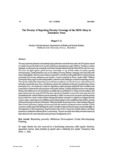Please use this identifier to cite or link to this item:
https://cris.library.msu.ac.zw//handle/11408/658| Title: | The poverty of reporting poverty: coverage of the MDG story in Zimbabwe Press | Authors: | Mugari, Zvenyika E. | Keywords: | Reporting poverty, milenium development goals, stereotyping, framing | Issue Date: | 2013 | Publisher: | Midlands State University | Series/Report no.: | The Dyke;Vol. 7, No. 2; p.73-94 | Abstract: | The issue of poverty attracted international policy attention around the time when the UN system named it number one and the bedrock of its eight millennium development goals (MDGs). Putting in motion strategies to reduce poverty necessarily contributes towards attainment of the other MDGs and vice-versa. This puts the fight against global poverty irrevocably on top of both media and policy agendas internationally. Global initiatives such as the Making Poverty History Campaign were launched with much media fanfare. But how mass media are expected to contribute to the global effort to end poverty has continued to be at most ambiguous and unclear. A report compiled by Panos London titled “Making Poverty the Story sought to draw policymakers’ attention to the challenges involved in reporting poverty. The way the media frame the poverty issue will have an influence on how the issue is understood and on attitudes towards the issue thus contributing towards the realisation of the goal of eradicating extreme poverty by 2015. On the face of it media are regarded as useful as long as they fulfill their normative role as purveyors of information and education in the public interest. Existing literature points to the media as having some influence on our perceptions of reality and our attitudes to it. Using content analysis, this paper explores how the story of MDGS has been reported in Zimbabwe’s press from when they were first proclaimed by the United Nations General Assembly in 2000. It arrives at the conclusion that the poverty story is either not a story or when it filters through journalistic treatment it conforms to stringent dictates of news values, requirements of credibility and an inbuilt appeal to elite sensibilities that the first casualty of the poverty story are the poor themselves. When journalists do poverty stories, what treatment they give them in terms of framing, angling and sourcing limits the repertoire of response options available. It is the contention of this paper that although the state controlled media and the privately owned media differ in their approach to reporting poverty, they both frame their stories in ways that are least likely to contribute positively to global and national efforts to end poverty. The poor are much more likely to become history by their absence in the news than for actual poverty to be defeated by 2015. | URI: | http://hdl.handle.net/11408/658 | ISSN: | 1815-9036 |
| Appears in Collections: | Research Papers |
Files in This Item:
| File | Description | Size | Format | |
|---|---|---|---|---|
| mugari.pdf | 16.21 MB | Adobe PDF |  View/Open |
Items in MSUIR are protected by copyright, with all rights reserved, unless otherwise indicated.


